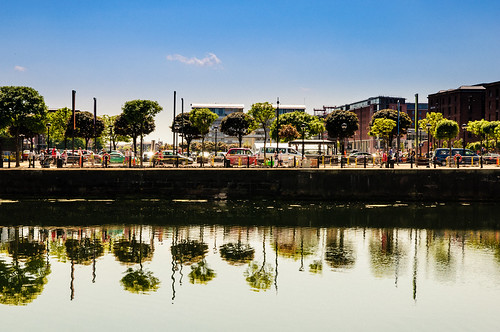From the category archives:
Academia
Daron Acemoglu has a piece at Project Syndicate arguing that basic income is a bad policy. His argument, in a nutshell, is that a truly universal basic income (UBI) would be prohibitively expensive, and that raising additional taxes to pay it “would impose massive distortionary costs on the economy”. The alternative, to cut all existing social programs for the sake of UBI, would be “a terrible idea”, since these programs are targeting those that are particularly vulnerable or needy. He argues that the political effects of a UBI would be bad – a UBI would “keep people at home, distracted, and otherwise pacified”, whereas “we need to rejuvenate democratic politics, boost civic involvement, and seek collective solutions”. For Acemoglu, the top priorities in the USA should be “universal health care, more generous unemployment benefits, better-designed retraining programs, and an expanded earned income tax credit (EITC)”, as well as higher minimum wages.
I share Acemoglu’s view that “One should always be wary of simple solutions to complex problems, and universal basic income is no exception.” In a paper I wrote last year (alas, in Dutch, and I haven’t had the time to translate it, but perhaps google translate can help us a little), I’ve argued that the debate on universal basic income is confused and confusing, and will not be getting us far, because too many papers/interventions are not clear about their assumptions, are not spelling out the goals (e.g. is the primary aim poverty reduction or creating freedom from the need to submit to the labour market for survival or something else), and are not giving the details of the package deal. [click to continue…]
I’ve been getting a lot of queries about Clarence Thomas’s concurring opinion in Box v. Planned Parenthood of Indiana and Kentucky. Briefly, Thomas spends all but a few paragraphs of his twenty-page opinion outlining what he sees as the eugenicist dimensions of abortion and birth control. This, as many have noted, is a new turn in Thomas’s abortion jurisprudence. Thomas essentially argues here that abortion is the way that women select and de-select the kinds of children they’re going to have.
What’s more, while much of the discussion on the right in this regard focuses on how considerations of the sex of the fetus or the presence of Down syndrome may influence the decision to have an abortion, Thomas focuses overwhelmingly on questions of race. Indeed, he spends an inordinate amount of time in his opinion rehearsing the role of racism in Margaret Sanger’s birth control movement. He discusses her work in Harlem and among African Americans in the South, as well as the connections between Nazism and eugenics. From there he goes to abortion. Reading Thomas, one comes away with the sense that abortion has nothing to do with the autonomy or equality of women but is instead a racist practice to control the size of the black population. The same goes for birth control.
At one point in the opinion, Thomas makes a point of noting the NAACP’s concerns during the 1960s about the racist dimensions of the birth control movement:
Some black groups saw “‘family planning’ as a euphemism for race genocide” and believed that “black people [were] taking the brunt of the ‘planning’” under Planned Parenthood’s “ghetto approach” to distributing its services. Dempsey, Dr. Guttmacher Is the Evangelist of Birth Control, N. Y. Times Magazine, Feb. 9, 1969, p. 82. “The Pittsburgh branch of the National Association for the Advancement of Colored People,” for example, “criticized family planners as bent on trying to keep the Negro birth rate as low as possible.” Kaplan, Abortion and Sterilization Win Support of Planned Parenthood, N. Y. Times, Nov. 14, 1968, p. L50, col. 1.
At another point in his opinion, Thomas slyly mentions that the majority opinion in Roe v. Wade cites the work of an extraordinarily influential and renowned British legal scholar who, according to Thomas, flirted with eugenics:
Similarly, legal scholar Glanville Williams wrote that he was open to the possibility of eugenic infanticide, at least in some situations, explaining that “an eugenic killing by a mother, exactly paralleled by the bitch that kills her misshapen puppies, cannot confidently be pronounced immoral.” G. Williams, Sanctity of Life and the Criminal Law 20 (1957). The Court cited Williams’ book for a different proposition in Roe v. Wade, 410 U. S. 113, 130, n. 9 (1973).
By the time the opinion is over, it seems like abortion and birth control are simply a Nazi-style mode of racial management of the demographics of a population.
However extreme this opinion may be, it is very much in keeping with Thomas’s overall approach to constitutional questions. I have a book about Clarence Thomas, The Enigma of Clarence Thomas, coming out on September 24, and I don’t want to give too much of it away, so let me just say this: One of Thomas’s most consistent moves in his jurisprudence is to take constitutional matters that left and right disagree about but nevertheless argue about on similar terms—Thomas consistently takes these matters and transforms them into questions of race. He does this with the Establishment Clause: where both sides are debating questions of religion, he makes it all about race. He does the same with the Takings Clause: where both sides are debating questions of eminent domain, he makes it about race. He does this with campaign finance: where both sides are debating speech and the First Amendment, he makes it about race. In each instance, he takes the topic at hand and says, nope, this is really about race. And goes from there.
What’s more, as I show in the book, this isn’t just a ruse or a way of trolling the left. It’s not just a simple playing of the race card. It’s, well, you’ll have to read the book. Which, as I said, is out on September 24 and which you can pre-order now.
There’s also a lengthy footnote in Thomas’s opinion in Box, where he compares the thinking underlying eugenics to that which underlies disparate impact, a doctrine that falls under the Equal Protection Clause of the Fourteenth Amendment. He cites the work of the conservative black economist Thomas Sowell. I think Thomas’s jurisprudence on disparate impact, as well as the impact and influence of Sowell upon Thomas, has been radically misunderstood. But again, I don’t want to give away too much of the book here. So…
Update (2 pm)
My wife Laura, who works in the reproductive rights movement, just made an excellent point about the parallel between Thomas’s opinion and the Anita Hill controversy. During the Senate confirmation hearings, when Hill accused Thomas of sexual harassment, there was a struggle in the commentary that boiled down to this question: Who gets to be black? Thomas and his supporters presented him as the embattled voice of the black community; Hill was depicted as a treacherous woman in alliance with liberal groups, trying to bring the black man—and with him, the black community—down. Thomas was black; Hill was a woman: that was the way the controversy played out, at least on one side. This was one of the many explosive insights at the heart of Kimberlé Crenshaw’s pioneering article “Mapping the Margins: Intersectionality, Identity Politics, and Violence Against Women of Color.”
Fast-forward to Thomas’s opinion in Box v. Planned Parenthood. Studies show that black women are far more likely to get an abortion than other women. Support for abortion among black women is among the highest of any demographic group. And as Jamila Taylor argued, because black women are more likely to live in states with restrictive abortion laws, they have a lot more to lose from Thomas-inspired or Thomas-inflected opinions. So who gets to be black here? Once again, in Thomas’s world, it’s not black women; this time, it’s the fetus.
This is as much a request for information as anything else, and I imagine that it is information that other academics want too!
Most of the courses my department teaches fall into one of four categories. There are large and small courses, and there are courses aimed at majors and courses not aimed at majors. Plenty of small courses are not aimed at majors; most large courses are not aimed at majors (the exception, sort of, is 101, which is aimed, partly at least, at attracting majors). In our context, large means 80-100 (with, occasionally, 160); small means 15-30.
I suspect, as do most of my colleagues, that more learning-per-student occurs in the small than in the large classes. This is far from certain, because we lack high quality measures of learning. We also assume that some teachers are better than others in large courses, and some are better than others in small courses, but we don’t know a great deal about who, because…. we lack high quality measures of learning.
We are not going to engage in a wholesale reform of our curriculum (that’s a prediction, not an insistence). Like most departments, though, we have some latitude in deciding how large our courses will be. The key choice that we can make is in how big to make the big courses, and how small to make the small courses. So, for example, we could keep our large courses as low as 80, and pay the cost in terms of allowing caps on our smaller courses to rise to (say) 30. [Of course we could decide to teach all, or nearly all, of our classes, as mid-sized, and if you could find me research that convinced me that was optimal I would share it with colleagues and try to persuade them, but I am putting that possibility aside to simplify things]. Because we lack high quality measures of learning, and because sample sizes are anyway small, we can’t make those decisions on the basis of what we know about our own situation, so it would be handy to have research that could tell us something useful.
But the research I have seen doesn’t tell me anything useful.
I’m in The New Yorker this morning, writing about Richard Evans’s new biography of the historian Eric Hobsbawm, explaining how the failures of Evans the biographer reveal the greatness of Hobsbawm the historian:
Hobsbawm’s biographer, Richard Evans, is one of Britain’s foremost historians and the author of a commanding trilogy on Nazi Germany. He knew Hobsbawm for many years, though “not intimately,” and was given unparalleled access to his public and private papers. It has not served either man well. More data dump than biography, “Eric Hobsbawm: A Life in History” is overwhelmed by trivia, such as the itineraries of Hobsbawm’s travels, extending back to his teen-age years, narrated to every last detail. The book is also undermined by errors: Barbara Ehrenreich is not a biographer of Rosa Luxemburg; Salvador Allende was not a Communist;
one does not drive “up” from Santa Barbara to Los Angeles.* The biography is eight hundred pages because Hobsbawm “lived for a very long time,” Evans tells us, and he wanted “to let Eric tell his story as far as possible in his own words.” But, as we near the two hundredth page and Hobsbawm is barely out of university, it becomes clear that the problem is not Hobsbawm’s longevity or loquacity but the absence of discrimination on the part of his biographer.Instead of incisive analyses of Hobsbawm’s books, read against the transformations of postwar politics and culture, Evans devotes pages to the haggling over contracts, royalties, translations, and sales. These choices are justified, in one instance, by a relevant nugget—after the Cold War, anti-Communist winds blowing out of Paris prevented Hobsbawm’s best-selling “The Age of Extremes” from entering the French market in translation—and rewarded, in another, by a gem: Hobsbawm wondering to his agent whether it’s “possible to publicize” “Age of Extremes,” which came out in 1994, “& publish extracts on INTERNET (international computer network).” Apart from these, Evans’s attentions to the publishing industry work mostly as homage to the Trollope adage “Take away from English authors their copyrights, and you would very soon also take away from England her authors.”
…
Hobsbawm was obsessed with boredom; his experience of it appears at least twenty-seven times in Evans’s biography. Were it not for Marx, Hobsbawm tells us, in a book of essays, he never would “have developed any special interest in history.” The subject was too dull. The British writer Adam Phillips describes boredom as “that state of suspended anticipation in which things are started and nothing begins.” More than a wish for excitement, boredom contains a longing for narrative, for engagement that warrants attention to the world.
A different biographer might have found in Hobsbawm’s boredom an opening onto an entire plane of the Communist experience. Marxism sought to render political desire as objective form, to make human intention a causal force in the world. Not since Machiavelli had political people thought so hard about the alignment of action and opportunity, about the disjuncture between public performance and private wish. Hobsbawm’s life and work are a case study in such questions. What we get from Evans, however, is boredom itself: a shapeless résumé of things starting and nothing beginning, the opposite of the storied life—in which “public events are part of the texture of our lives,” as Hobsbawm wrote, and “not merely markers”—that Hobsbawm sought to tell and wished to lead.
***
Down the corridor of every Marxist imagination lies a fear: that capitalism has conjured forces of such seeming sufficiency as to eclipse the need for capitalists to superintend it and the ability of revolutionaries to supersede it. “In bourgeois society capital is independent and has individuality,” “The Communist Manifesto” claims, “while the living person is dependent and has no individuality.” Throughout his life, Marx struggled mightily to ward off that vision. Hobsbawm did, too.
…
But what the Communist could not do in life the historian can do on the page. Across two centuries of the modern world, Hobsbawm projected a dramatic span that no historian has since managed to achieve. “We do need history,” Nietzsche wrote, “but quite differently from the jaded idlers in the garden of knowledge.” Hobsbawm gave us that history. Nietzsche hoped it might serve the cause of “life and action,” but for Hobsbawm it was the opposite: a sublimation of the political impulses that had been thwarted in life and remained unfulfilled by action. His defeats allowed him to see how men and women had struggled to make a purposive life in—and from—history.
The triumph was not Hobsbawm’s alone. Moving from politics to paper, he was aided by the medium of Marxism itself, to whose foundational texts we owe some of the most extraordinary characters of modern literature, from the “specter haunting Europe” to the resurrected Romans of the “Eighteenth Brumaire” and “our friend, Moneybags” of “Capital.” That Marx could find human drama in the impersonal—that “the concept of capital,” as he wrote in the “Grundrisse,” always “contains the capitalist”—reminds us what Hobsbawm, in his despair, forgot. Even when structures seem to have eclipsed all, silhouettes of human shape can be seen, working their way across the stage, making and unmaking their fate.
You can read it all here.
Also, as many of you know, for the last two years, I’ve been making the case that Donald Trump’s presidency is what the political scientist Steve Skowronek calls a “disjunctive” presidency. Over at Balkinization, I use the opportunity of my deep, deep agreement with the great Jack Balkin—whose views on so many things I share, and who also has argued for Trump as a disjunctive presidency—to raise some questions about our shared position, and where our analysis may go awry. You can read that here.
* Several astute readers pointed out to me that this locution of traveling “up” somewhere is often used in Britain to signify going from a smaller to a larger place rather than traveling from south to north. I passed the information on to my editor at The New Yorker, and they’ve now cut the phrase from the text. I’m leaving it here because, well, the error was mine, and in a passage where I’m pointing out Evans’s errors, I should acknowledge my own.
I’ve been looking over some posts from the bright dawn days of blogging in the early 2000s. One thing that struck me is that some ideas I put forward as unconventional but evidence based, are now fairly widely accepted. In view of the widespread, and justified, concern about a post-truth era, this seems encouraging, and worth investigating. A few examples
* In this post on equality of opportunity from 2003, I noted that “contrary to popular belief, there is less mobility between income classes in the United States than in European social democracies.” I was drawing on a 1999 book, The Real Worlds of Welfare Capitalism by Goodin, Headey Muffels and Dirven, which I’d reviewed a couple of years previously. In 2009, when I started work on Zombie Economics, I wrote about this again. However, I soon realised I was pushing at an open door. The decline of social mobility in the US had become part of the conventional wisdom.
* In 2004, some of the first studies of charter schools were coming out, showing that, contrary to the widely-shared expectations of education reformers, they weren’t showing any clear gains in student performance. I wrote about this fairly cautiously, noting that studies of this kind often fail to find any effect. As it turned out, however, the findings were replicated, particularly in the case of for-profit schools. This piece in the Washington Post (which used to be associated in some way with the for-profit testing industry, IIRC) shows how much the tide has turned against charters, and even more against for-profits.
* Here’s a post on minimum wages, drawing on the work of David Card and Alan Krueger (whose tragic death recently was a big loss to the economics profession). from the early 1990s. By then, the formerly orthodox view that minimum wages had big negative effects on employment was sufficiently out of favour to be revived in Slate (then famous, or notorious, for “contrarian” views that generally tended to support the establishment).
* Finally, I wrote a couple of mildly snarky pieces about the “Reading Wars” between phonics and whole language. This was one of the relatively rare cases in which the emerging evidence supported the cultural right. It’s pretty hard nowadays to find unequivocal supporters of whole language.
Looking at these examples, there’s a gap of about 10 years between the time the evidence emerged (or at least, emerged prominently enough for me to take notice) and the time the conventional wisdom adjusted. That doesn’t seem too bad. As the great replication crisis has shown, it’s unwise to take too much notice of an individual study on any social science topic.
Unsurprisingly, most of the examples above are cases where the emerging evidence was consistent with my broad political principles (I was never engaged in the Reading Wars, though I mostly lined up against the phonics advocates on other issues). I’d say that’s because most of the evidence we’ve had in the past twenty-five years or so has gone against the beliefs of the political right, who have had to retreat from the triumphalism of the early 1990s. But it’s obviously possible that there is confirmation bias at work. I’d be interested to see suggested examples of evidence shifting the conventional wisdom to the right in this period.
I teach a standard Contemporary Moral Issues/Applied Ethics course once a year, usually in the Spring, in lecture format, usually with 80-100 students (but this year with 170). Normally about 70% of the students are seniors, and about 70% are business majors (it meets an ethics requirement in the business major). We discuss topics such as abortion, inequality in education, parental licensing, the gendered division of labor. I have added two new topics this year—sex on campus, and speech on campus. Each semester I get them to take a long survey which includes questions about what their beliefs are about the topics, prior to studying them in class. A few years ago I started getting them to take a survey at the end of the class, about their post-study beliefs, whether they have changed their minds, and whether they think they know what I believe.
I want to know whether they have changed their minds because I am curious about whether they have really done the thinking I want them to have done. Most are encountering, and having to consider seriously, intelligent arguments for the “other side” for the first time, so at least some of them should have their confidence somewhat shaken. I want to know whether they think they know my beliefs because I am a reasonably strict non-discloser, and want to know whether, in fact, I succeed in not disclosing. If they all believed they know what I think, and were right about what I think, that would indicate that I fail!
[click to continue…]








